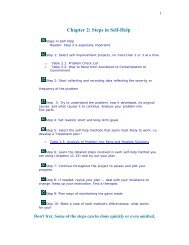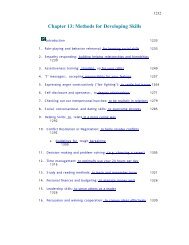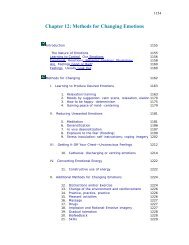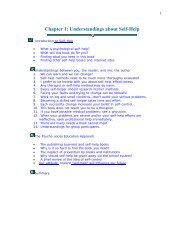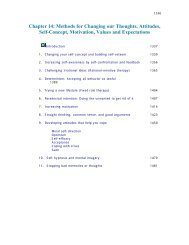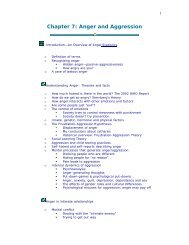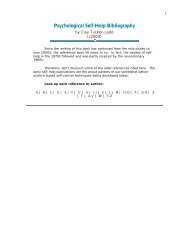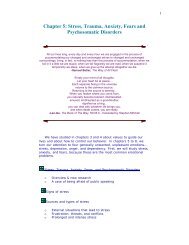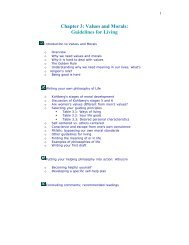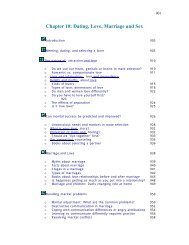Methods for Changing Behaviors - Psychological Self-Help
Methods for Changing Behaviors - Psychological Self-Help
Methods for Changing Behaviors - Psychological Self-Help
You also want an ePaper? Increase the reach of your titles
YUMPU automatically turns print PDFs into web optimized ePapers that Google loves.
<strong>Self</strong>-punishment<br />
Miller, L. K. (1980). Principles of everyday behavior analysis<br />
(2nd ed.), Monterey, CA: Brooks/Cole.<br />
Punishment is administering something hurtful immediately<br />
following an unwanted behavior so it will stop. We all understand how<br />
it works...and it works effectively if the punishment is immediate,<br />
severe enough and administered consistently. Aversive control of<br />
others permeates our culture: parents yell at and spank children,<br />
society fines and imprisons law-breakers, schools give low grades and<br />
fail students, employers threaten to fire workers, religions damn us <strong>for</strong><br />
sinning, governments go to war to kill others. Yet, it is a procedure so<br />
fraught with difficulties and unpredictable consequences that many<br />
people, including psychologists, think punishment should not be used<br />
with others at all. Punishment may arouse fear and anger; it doesn't<br />
teach any improved behavior and it may only suppress some behavior<br />
while the punisher is watching.<br />
However, punishment can stop certain behaviors. Even watching<br />
someone else be punished can have a powerful impact on our behavior<br />
in the same situation <strong>for</strong> a long time. The questions are: can selfpunishment<br />
have a powerful influence on our own behavior? Does selfadministered<br />
punishment have bad consequences too? Surely not the<br />
same feelings of fear and unfairness as when someone else is<br />
punishing us. Un<strong>for</strong>tunately, science doesn't know yet what goes on in<br />
our head in terms of attributions, self-instructions, and self-esteem<br />
when we self-punish? Nor do we know the emotional or behavioral<br />
consequences of self-punishment.<br />
Just as punishment of others is a common, "natural" response to a<br />
hurt or insult, self-criticism and self-directed anger is a common<br />
response to failure in some people. Just as psychologists don't know,<br />
yet, the consequences of venting our anger caused by others, we don't<br />
know if venting anger against ourselves is helpful or not. Clearly, some<br />
great athletes and scholars are highly self-critical if they make a<br />
mistake, but we don't know if that contributed to their greatness or<br />
detracted from it. Prolonged self-hatred is extremely harmful, but what<br />
about temporary and specific self-criticism? Does self-censure have<br />
the same effects on our behavior as self-punishment? We don't know<br />
but we know many people are self-critical (in the extreme they<br />
become depressed). For now, each of us has to find out <strong>for</strong> ourselves<br />
when self-hurt--physical and emotional--is harmful and when is it<br />
helpful? (Actually, we probably adopt or reject this technique early in<br />
childhood sans scientific data.)<br />
Purposes: Please note that this method deals only with self -<br />
punishment.<br />
1141



